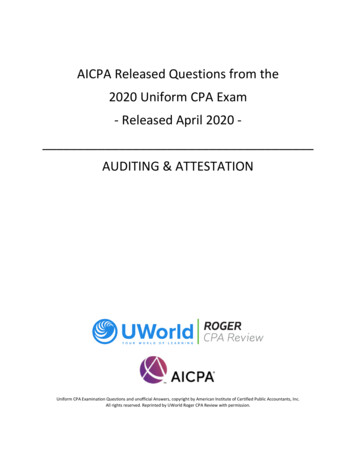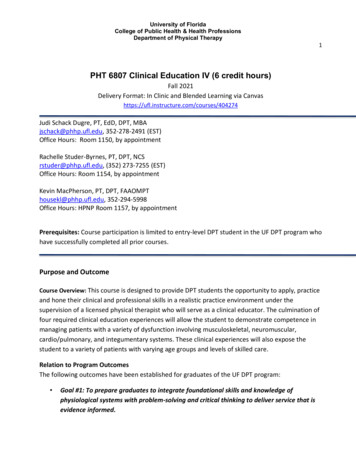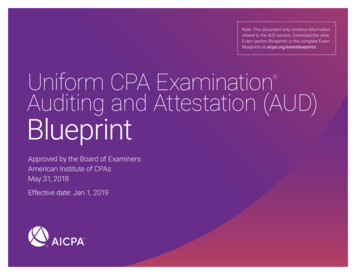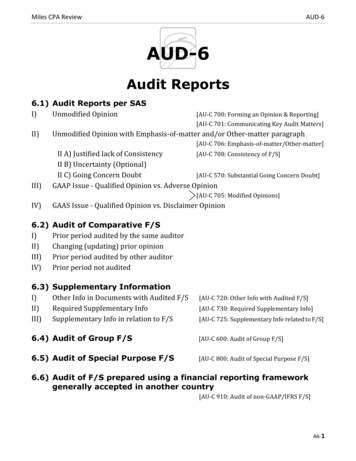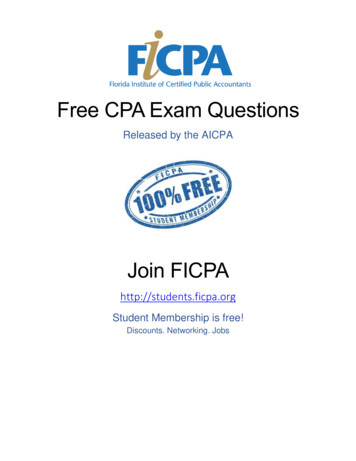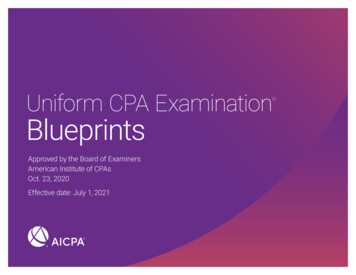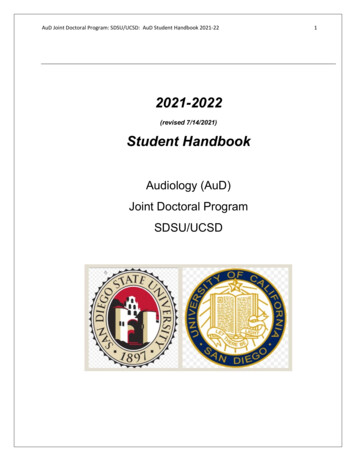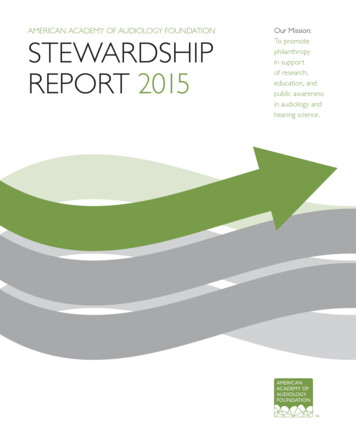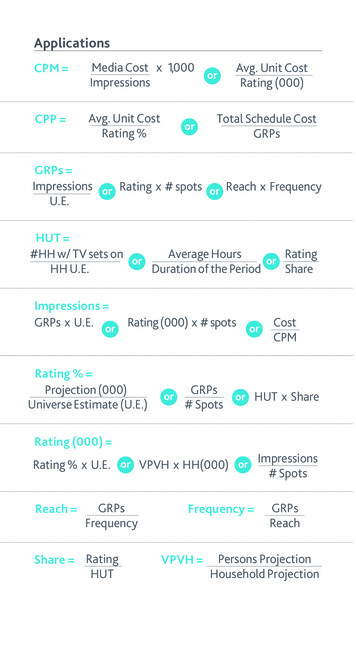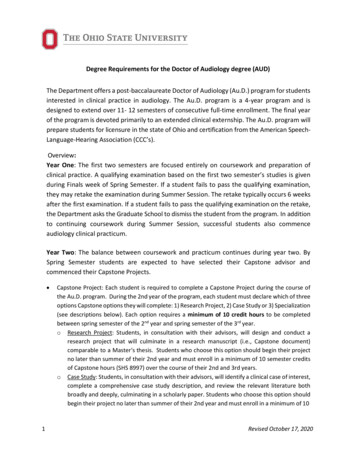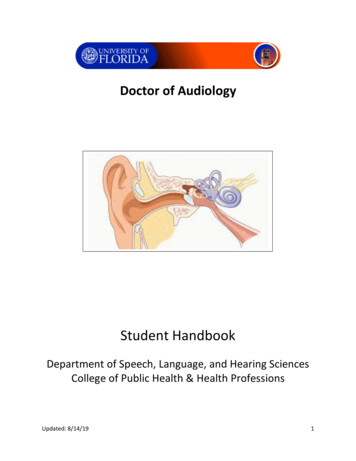
Transcription
Doctor of AudiologyStudent HandbookDepartment of Speech, Language, and Hearing SciencesCollege of Public Health & Health ProfessionsUpdated: 8/14/191
Mission Statement. 4To preserve, promote, and improve the functioning and general well-being of individuals andcommunities by educating our students in the detection, prevention, diagnosis and management ofhearing and balance disorders. . 4Referenced Faculty . 4Program of Study . 4Annual Reviews of Student Progress/Performance . 14Adequate Progress. 15Exit Interview/Certification for Graduation . 16IMPORTANT UF POLICIES . 16Equitable Treatment of Individuals . 16UF Resources . 17AuD Program Grievance Policy. 17AUD PROGRAM POLICIES AND PROCEDURES . 18AuD Program Dress Code . 18Professional Behaviors for Audiology Students . 19AuD Program Clinic Absence Policy . 19CONTACT INFORMATION . 21AuD Program . 21AuD Faculty . 22Speech, Language and Hearing Sciences Staff . 22Liability Insurance . 22Licensure and Certification . 23You will be required to have an Audiology license in the state you choose to practice. You may alsochoose to obtain clinical certification which is available from both ASHA and the ABA. . 23ASHA Certification: . 23ABA Certification: . 23Updated: 8/14/192
Dear Student,Welcome to the UF Doctor of Audiology program! We hope you will find this Student Handbook helpfulas a graduate student in our program.Within the school of Public Health and Health Professions, you are part of a community with a longtradition of excellence, dedicated to preparing the world’s finest skilled audiologists, public healthleaders, health policy specialists, faculty, and researchers. Most notably our students and facultymembers participate in advancing the knowledge in our field through their clinical and researchactivities. As a member of this profession, you will be committing to providing the best diagnosis,treatment, and management of hearing and balance disorders in various populations of all ages. Youaccept this commitment by starting your doctoral education at the University of Florida.The mission of the Doctor of Audiology (AuD) program is to “preserve, promote, and improve thefunctioning and general well-being of individuals and communities by educating our students in thedetection, prevention, diagnosis and management of hearing and balance disorders.” To fulfill thismission, you will be challenged in your courses to understand the scientific evidence that supports ourpractice, learn to apply your knowledge from your research and coursework into your clinical practice,and professionally and ethically serve your patients and their families. By accepting a position in thisprogram, you are committing yourself to lifelong learning, because neither the scientific understandingsnor the practice or audiology will stagnate at the time of your commencement. Continual growth is thenature of our profession, and you will need to continue to be an advocate for your learning, if you are toprovide the best care for your patients throughout your career.The faculty, staff, and clinical preceptors are all committed to supporting you in meeting theseexpectations. We will provide you with instruction, guidance, practice and corrective feedback to assistyou along the way. We are committed to your successful completion of this program so that you maybecome a doctor of audiology and that once employed, are recognized for your competence, leadership,ethics, and commitment to our profession. All of which you were learned at the University of Florida.Sincerely,The UF Audiology FacultyThis Handbook is subject to revision during the academic year.Updated: 8/14/193
Mission StatementTo preserve, promote, and improve the functioning and general well-being ofindividuals and communities by educating our students in the detection,prevention, diagnosis and management of hearing and balance disorders.Referenced FacultySusan Nittrouer, PhD – Professor and ChairJill Raney, PhD – Clinical Associate Professor and AuD Program DirectorKrista Fitzgerald, AuD, CCC-A, CNIM – Clinical Assistant Professor and Coordinator of Clinical EducationProgram of StudyThe goal of AuD program is to prepare students to design and deliver effective, culturally-sensitive,evidence-based clinical services in audiology. The curriculum is designed to prepare students who arewell qualified for employment in a range of education and health-related settings. In addition, asprofessionals they will be recognized for their competence, leadership, ethics and commitment to serveand life-long learning. The curriculum provides a sound foundation for those students who areinterested in pursuing graduate work toward a PhD in audiology.The program is a 4 year (12 semesters) course of study emphasizing the principles, practices andresearch underlying the evaluation and (re-)habilitation of human auditory and vestibulardisorders. The course of study includes a 1 year (3 semesters) clinical extern occurring in the student’s4th year. The program incorporates didactic instruction and research experience overlapping withclinical rotations, and competency-based evaluations.The externship during the 4th, and final, year of the program provides the student with the opportunityto hone their clinical skills in a variety of areas. Therefore, potential externships sites must meet withthe approval of the Coordinator of Clinical Education and the AuD Program Director. The highestpriority requirements for an externship site are:1. The availability of on-site supervision by an appropriately credentialed, doctoral-levelaudiologist;2. The availability of a range of experience in evidence-based audiologic practice appropriate tothe student's needs.The Coordinator of Clinical Education will work in conjunction with the student to determineappropriate 4th year externship assignments. Students will need to apply for positions and successfullyinterview with potential externship preceptors. The externship experience may or may not be a paidposition.Completion of the program leads to the Doctor of Audiology (AuD) degree, and eligibility for theCertificate of Clinical Competence in Audiology (CCC-A, awarded by the American Speech-LanguageUpdated: 8/14/194
Hearing Association), Board Certification in Audiology from the American Academy of Audiology, and forstate licensure/registration in Audiology.Sample CurriculumYou will be placed in the appropriate courses each semester by the program. Information about coursesand clinical assignments will be provided through the AuD Student Center program site, accessible atelearning.ufl.edu. Students without an undergraduate background in Speech and Hearing may need totake additional courses.Individual cohorts may take courses in a different order than listed here.AuD Plan of Study 2020-2021Course #SPA 5102SPA 6010SPA 6340SPA 6133LSPA 5304SPA 5051SPA 6581SPA 6324SPA 6324SPA 6341SPA 6581SPA 6581SPA 6506GMS 6705SPA 6805SPA 6531SPA 6581SPA 6323SPA 6305SPA 7833SPA 6506PHC6050SPA 7354Course TitleFall 1Anatomy & Physiology of Hearing & BalanceBasic Auditory SciencesAmplification IAmplification LabPrinciples of Audiologic EvaluationInitial Clinical ExperienceSpring 1InstructorMedical AudiologyAudiologic Rehab-ChildrenAudiologic Rehab-School AgeAmplification IIAdvanced Amplification LabCochlear Implants IClinical ClerkshipSummer 1Functional Human NeuroanatomyIntro to Grad ResearchClinical PracticumFall 2Electrophysiology with labAudiologic Rehab-AdultsPediatric AudiologyAudiology Research ProjectClinical ClerkshipSpring 2StatisticsSeminars in ted: 2335
SPA 6581SPA 7833SPA 6531SPA 6581SPA 6390SPA 7833SPA 6531SPA 6317SPA 6581SPA 6581SPA 7833SPA 7945SPA 6270SPA 6564SPA 6581SPA 7945SPA 7958SPA 7958SPA 7958Cochlear Implants IIAudiology Research ProjectClinical PracticumSummer 2Auditory PharmacologyProfessional IssuesAudiology Research ProjectClinical PracticumFall 3Vestibular DisordersASL for AudiologistsAdvanced Topics in Audiology (Vestibular)Audiology Research ProjectGraduate PracticumSpring 3Auditory Processing DisordersCommunication & AgingCounselingGraduate PracticumSummer 3ExternshipFall 4ExternshipSpring aldSomeyaRaneyVariousTotal Credits321923131232313133334555555110Course descriptions can be found in the graduate catalog at:http://gradcatalog.ufl.edu/content.php?catoid 11&navoid 2380Grand Rounds RequirementFor each semester a "Grand Rounds" schedule will be completed and dispersed to the students.Students are expected to attend Grand Rounds and will need to complete two presentations within thefirst 3 years of the Au.D. program. We understand that clinical site placements may interfere with theschedule of this event. Any issues with attendance should be brought to the attention of the GrandRounds advisor. Grand Rounds topics may include but are not limited to: research, case studies, andspecial topics. The designated advisor will approve topics and the grand rounds schedule in advance. Ifyou select a case study, it is important that you notify the preceptor and obtain permission to presentthe case. Proof of their approval will need to be submitted to the Grand Rounds advisor prior topresenting.Updated: 8/14/196
Research ExperienceAs part of the AuD program students will gain experience in the various aspects of conducting research,including literature review, research methods, data analysis and written report of the work. Beginningin the summer after the first year, students will complete SPA 6805, Introduction to Graduate Research.In the fall of the second year, as part of SPA 7833, Audiology Research Project, students will identifypotential research projects of interest. In order to secure a position in a lab where they will work ontheir project, students will complete an application that will be reviewed by the faculty member andProgram Director. Students will continue to register for SPA 7833 through the fall of their third yearwhile they are working toward the completion of their research project. The specific details of theresearch project are outlined in the document, AuD Research Project Guidelines.CLINICAL EDUCATION AND SUPERVISONPhilosophy of TrainingClinical services in Audiology are provided by audiologists within the solid ethical framework of theAmerican Speech and Hearing Association (ASHA) and the best standards of clinical practice for thewelfare of our patients. The mission of Audiology practice under ASHA is to empower and supportaudiologists through advancing science, set standards, foster excellence in professional practice, andadvocate for members and those they serve.Training at the University of Florida encompasses a graduate adaptive skill set model of learning withclinicians of different levels of experience and specialties from the first practicum through 4th yearexternship. This includes our affiliation with Shands Hospital and the Veteran’s Administration Hospitalin Gainesville and Ocala, along with various off-site clinical placements in the state of Florida andthroughout the United States.Within this framework, students develop clinical competencies, write impactful assessments/referrals,practice clinical interventions and rehabilitative services, develop new professional interests, expandtheoretical understandings and work with clinical teams- all with the over-arching goal of substantialgrowth in their clinical confidence and self-esteem.Observation in AudiologyAll students are required to have 25 hours of clinical observation before working with patients. Studentswho have not completed 25 hours of Audiology observation should acquire these before the beginningof their first semester in the AuD program. Students needing to complete these hours at UF in the weeksbefore the Fall Semester should contact Dr. Krista Fitzgerald. The observation log sheet is located in theResources folder on the AuD student center.Clinical Practicum Assignments/RequirementsFall 1: SPA 5051-Initial Experience in Audiology (1 credit)This is for beginning level graduate students in audiology. Students are assigned one clinic per week.“Clinic” 1 four hour block. The Coordinator of Clinical Education determines these clinicalassignments. At the end of this semester, students should demonstrate knowledge in basic audiologicevaluations, which includes but not limited to, audiometer calibration and operation, audiometricUpdated: 8/14/197
symbols, otoscopy, tympanometry, pure-tone air and bone audiometry, speech audiometry, as well aseffective interactions with patients, families, and other appropriate individuals and professionals.Spring 1: SPA 6506- Clinical Clerkship (1 credit)This is the beginning level for audiologic practicum. Students are assigned two clinics of clinicalpracticum per week. Students will continue to acquire knowledge in audiologic evaluation, counseling,and report writing and documentation. During this practicum, students will begin to demonstrate theirability to perform more advanced competency skills that relate to their assigned clinics.Summer 1: SPA: 6531 Clinical Practicum (2 credits)Students are assigned three clinics of clinical practicum per week. Students will continue to fine-tunetheir skills and comprehension in audiologic testing while continuing to perform more advancedcompetency skills that relate to their assigned clinics.Fall & Spring 2: SPA 6531- Clinical Practicum (2 credits)Students are assigned three clinics of clinical practicum per week. Students continue to demonstrategreater depth and breadth of clinical competencies related to their assigned clinics.Summer 2: SPA 6531- Clinical Practicum (3 credits)During the summer semester, your clinics will be divided into A and B. Students will be assigned fourclinics per week for Part A and six clinics per week for Part B OR vice versa. This will depend on yoursummer course offerings. The Coordinator of Clinical Education will inform you on how many hours willbe required during A or B prior to the start of your summer semester. Students will continue todemonstrate their ability to perform more advanced competency skills that relate to their assignedclinics and become more independent on effective communication with patient, families, and otherhealth professionals.Fall and Spring 3: SPA 7945 Graduate Practicum (Fall 3 credits, Spring 4 credits)Students are assigned four clinics per week of clinical practicum. During your third year, you areencouraged to explore outside clinical placements if you so desire. Outside clinical placements are at thediscretion of the Coordinator of Clinical Education and the Supervisor for the outside clinical placement.Availability is limited by class schedule and academic and clinical progress.Audiology Fourth Year Externship: SPA 7958 (Summer 3, Fall 4, Spring 4- 5 credits each semester)Students will work 30-40 hours per week at an approved external clinical site. Students will demonstrateindependence and mastery in their clinical practice.Clinical Performance EvaluationsPlacement of students in practicum sites will be completed to ensure the development of the range ofcompetencies in the audiological scope of practice. Student clinical progress will be evaluatedthroughout the program to track the development of these competencies, along with studentsevaluating the clinicians’ performance through the program.Student clinicians will be evaluated midterm and at the end of each term using the UF “Summary ofClinical Performance Audiology” form. In addition, audiological preceptors will provide regular feedbackto the student regarding student performance. We encourage students to discuss their mentoring needsrelated to clinical progress with their preceptors.Updated: 8/14/198
At the end of the semester, evaluations with be collected so that grades for clinical practicums can besubmitted. Late evaluations will result in an “Incomplete” until it is obtained.Placements for clinical rotations are based on the student’s competencies and the availability of thepositions in particular sites. When possible, the Coordinator of Clinical Education will take intoconsideration student requests.In accordance to ASHA, students are supervised 100% for their first 10 hours of patient/clinicianinteraction. After the first 10 hours, supervision ranges from 25-100% as appropriate to the clinical areaof practice and the student’s progress.Record KeepingClinical Hours: Students are responsible for maintaining up to date records of clinical hours via theTyphon System. Instructions for logging into Typhon and its use will be provided at orientation by theCoordinator of Clinical Education. Hours should be logged daily.During the last week of each clinical practicum, you are to fill out the “Au.D. Program Supervised ClinicalExperience Form” and have your preceptor(s) sign off on the hours obtained with them. Once this iscompleted, you are to return the document to the Coordinator of Clinical Education who will approveyour hours in Typhon. Please make sure that your total hours match the form and Typhon log. If the“Au.D. Program Supervised Clinical Experience Form” is not submitted by the end of the semester intime for approval of clinical hours in Typhon, your grade for clinical practicum will be incomplete.In addition to logging your clinical contact hours and clinical experience details in Typhon, the AuDprogram requires that you complete and retain a self-assessment of your acquisition of knowledge andskills. The tool to assist with this is known as the “Knowledge and Skills Assessment”, or KASA form.Off-Site Clinical Placements1. Generally, the first and 2nd year of student’s clinical experience will happen at UF ShandsAudiology Department.2. Off-site clinical placements are possible during the 3rd year at the discretion of theCoordinator of Clinical Education.3. Off-site clinical placements must be approved by the Coordinator of Clinical Education and mayrequire a site visit. For any student to be supervised by an offsite placement that does not havean affiliation agreement with the University of Florida, one must be established prior to thestudent starting. The Coordinator of Clinical Education will work with UF’s legal department andoff-site placement to establish an affiliation agreement.Professional BehaviorAll information pertaining to any patient is confidential. Students should strive to protect therights of patients. ASHA and AAA Code of Ethics must be maintained at all times. Please see thesites below for more ument-library/code-ethicsUpdated: 8/14/199
Dress CodeStudents are expected to observe appropriate dress in compliance with the policies at the clinicalplacement/externship site.Fourth Year ExternshipEligibility for Externship Assignment1. 78 credits hours of coursework in all aspects of basic science, applied audiology and clinicalresearch and 17 hours of clinical education experience in the doctorate of audiology (Au.D.)program.2. In good standing with the University of Florida, the College of Public Health & Health Professionsand the department of Speech Language and Hearing Sciences.3. Successful completion of the Au.D. research project.Extern Site SelectionThe fourth year externship experience occurs outside the University of Florida. Opportunities tocomplete a fourth year in Gainesville are available; however are based on the openings at those facilitiesand are limited. It is recommended that the site have a broad base of clinical activities in audiology togive the student as much experience to make them a strong candidate for hire once licensure isobtained. Externships, which provide a more specialized practice experience may be acceptable, basedupon the breadth of the students clinical experience in their first three years of the program.The role of the chosen fourth year externship will be to offer supervision and consultation with thestudent regarding their clinical activities and to provide feedback on their progress. The Au.D. student isresponsible for locating and securing their externship placement that meets all the stated requirements.Information sent to the Coordinator of Clinical Education by externship sites with available positions willbe shared via email.Extern Site RequirementsThe following requirements must be followed:1. The Coordinator of Clinical Education is responsible for determining the appropriateness ofclinical placements and maintaining contact with the extern preceptor.2. An affiliation agreement between the externship site and the University of Florida must becompleted before the fourth year student begins their externship.3. The extern preceptor must hold their ASHA certification of Clinical Competence (CCC) and theirstate licensure in audiology. Copies of current state licensure and/or ASHA CCC must besubmitted to the Coordinator of Clinical Education (Dr. Krista Fitzgerald) before the student maybegin the externship.Updated: 8/14/1910
4. At the extern site there must be a doctorate level audiologist on site at all times to offer theextern immediate consultation/feedback as needed.5. The externship is defined as no less than 48 weeks of full time employment. A minimum of 30hours per week constitutes full time employment. At least 80% of the externship work weekmust be in direct patient contact.6. The role of the preceptor includes the following:a. Conferring with the extern concerning clinical treatment strategies.b. Periodically evaluating the extern’s clinical records, including diagnostic records,treatment records, correspondence, and plans of treatment.c. Evaluating the extern on the basis of consultation with professional colleagues andemployees.d. Evaluating the externs work on the basis of counseling patients and their familiese. Monitoring the extern’s contribution to professional meetings, as well asparticipation in other professional growth opportunities.7. Extern preceptors will report quarterly on the progress of the student. Evaluation forms will beprovided to the preceptors by the Coordinator of Clinical Education.Essential Functions and Technical Standards/Guidelines: Knowledge and Skills Essential to thePractice of Speech-Language Pathology and AudiologyIn order to acquire the knowledge and skills requisite to the practice of speech-language pathologyand/or audiology, to function in a broad variety of clinical situations, and to render a wide spectrum ofpatient/client care, individuals must have the following five types of skills and attributes: servationalBehavioral-socialThese skills enable a student to meet graduate and professional requirements as measured by statelicensure and national certification. Many of these skills can be learned and developed during the courseof the graduate program through coursework and clinical experience. The starred items in the expandedlists below (*) are skills that are particularly relevant and should be present when a student begins theprogram. The burden is on the applicant to demonstrate that he/she can meet the essential functions orrequirements of the program. The lists below represent technical standards and essential functions thatare required (with accommodations when necessary) for admission and graduation.All students pursuing a health care profession such as speech-language pathology or audiology “mustpossess those intellectual, ethical, physical, and emotional capabilities required to undertake the fullcurriculum and to achieve the levels of competence required by the faculty” and the profession (AAMC,Updated: 8/14/1911
p. 2). Some students may have certain disabilities or combinations of disabilities which will requireaccommodations in order to meet the technical standards and essential functions required of allstudents. The faculty of the Department of Speech, Language, and Hearing Sciences recognize that andwill “take all necessary steps to prevent unjustified discrimination against” individuals with disability(AAMC, p. 2).It is the goal of the CSD program to graduate qualified individuals in the fields of speech- languagepathology and audiology. Academic faculty and clinical faculty are charged with evaluating students withrespect to their performance on the standards presented below. If you feel you are unable to meetthese standards, it is your responsibility to notify the appropriate faculty member(s) to seekaccommodations, and then to register with and be verified as disabled by the Disabilities ResourceProgram on campus (http://www.dso.ufl.edu). All students admitted to the graduate programs in theDepartment of Speech, Language, and Hearing Sciences are beholden to the professional standardsneeded to successfully engage in the speech-language pathology and/or audiology professions.COMMUNICATION: A student must possess adequate communication skills to:1. Communicate sufficiently in English in order to engage in clinical activities independently,conduct accurate assessments and provide effective intervention, provide consultation topatients/clients, caregivers of patients/clients, and health care professionals and perform otherrelated functions associated with professional practice.2. Demonstrate reading and writing skills sufficient to meet curricular and clinical demands.3. Demonstrate non-verbal communication skills sufficient to meet curricular and clinicaldemands.*4. Modify communication style to meet the communication needs of the patients/clients,caregivers, and other persons served.*5. Communicate professionally and intelligibly with patients/clients, colleagues, other healthcareprofessionals, and community or professional groups.6. Communicate professionally and effectively on patient/client documentation, reports, andscholarly papers required as part of coursework and professional practice.7. Convey information that is accurate, relevant and culturally sensitive.MOTOR: A student must possess adequate motor skills to:1. Access transportation to academic and clinical placements.*2. Participate in classroom and clinical activities for the defined workday.*3. Efficiently manipulate testing and treatment environment and materials without violation oftesting protocol and with best therapeutic practice.4. Manipulate patient/client-utilized equipment (e.g., durable medical equipment to includeAAC devices, hearing aids, etc.) in a safe manner.5. Access technology for clinical management (i.e., billing, charting, therapy programs, etc.)6. Be able to assist clinical clients/patients in case of fire or other emergencies.INTELLECTUAL/COGNITIVE: A student must possess adequate intellectual and cognitive skills to:1. Comprehend, retain, integrate, synthesize, infer, evaluate and apply written and verbalUpdated: 8/14/1912
2.3.4.5.information sufficient to meet academic and clinical curricular demands.*Identify significant findings from history, evaluation, and data to formulate a diagnosis anddevelop a treatment plan.Solve problems, reason, and make sound clinical judgments in patient/client ass
Updated: 8/14/19 6 SPA 6581 Cochlear Implants II Sheffield 3 SPA 7833 Audiology Research Project Various 2 SPA 6531 Clinical Practicum Various 1 Summer 2 9 SPA 6581 Auditory Pharmacology Someya 2 SPA 6390 Professional Issues Swami 3 SPA 7833 Audiology Research Project Various 1 SPA 6531 Clinical Practicum Various 3 Fall 3 12 SPA 6317 Vestibular Disorders Raney 3
